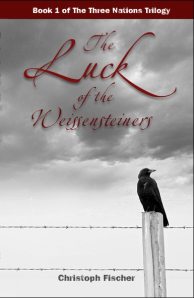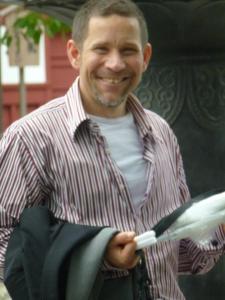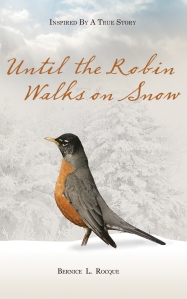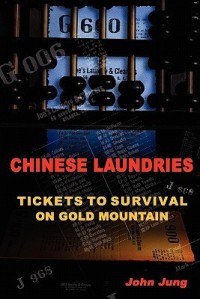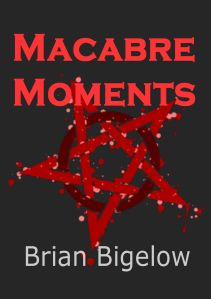Review of Noir:
“Noir” by Nathan Squiers is the first in his Crimson Shadow series. It concerns Xander, a boy who gets bullied at school and who lives with his grandmother. The only good friend he has is a voice in his head, yet that voice cannot protect him from his enemies either.
Then one day he gets rescued by a group of vampires, the Odin Clan, and becomes part of their community, a rare type of vampires who are feeding from blood and from personal power. He receives training and enters into battle against their enemies.
This is as much a vampire tale as it is symbolic for the struggle for personal power and good use for it. Having been a victim has changed Xander and makes him an unlikely candidate to join “bad” creatures. His feelings of rage need to be contained – there is a sensei/ teacher in Xanders training who helps him with these struggles.
Very well written and perfectly paced the author has given us a great read and a skilfully developed character in Xander. I will say that this type of story about supernatural powers and the struggle for personal control and self-discipline has been done many times before but this is one of the few times where I actually bought it, cared for the characters and started to understand why it has the following it has. Incredibly well done!
Interview with Nathan:
-Nathan, how did you come to writing?
I’d always been interested in storytelling. As a kid, even before I knew how to write, I was always drawing pictures in crayons based on stories in my mind or intricately enacting scenes and adventures with my action figures. As the years passed my interest in creating stories only grew, and the introduction of writing just sort of got assimilated with the other methods I used. As my more “childish” activities (donning costumes and running around the neighbourhood pretending to be a superhero or dipping into an overflowing bin of toys to create some grand new heroic battle) have dwindled, writing has simply survived and prospered with a growing wealth of vocabulary and ideas.
-What would you say exactly is your preferred genre and why have you chosen it? Is that the type of books you read as well?
If I had to funnel it down to only one genre I’d say it’d be psychological dark urban fantasy. Most of my work is set in a realm of fiction that my fiancé and I co-created through several years of research, and, aside from the customized creature-types, I’ve always defined my style as being very emotionally driven; not one of my stories ever being so simple as to have solely one conflict and, for the most part, incorporates an equally (if not more) threatening struggle with oneself as well as whatever external force they’re up against.
This, however, is not the only thing I write (I’ve even been known to write non-fiction/articles lol), and, that being the case, I don’t restrict my reading lists to that genre, either. While I DO enjoy it, I’m also partial to well-structured romance, mystery, and even philosophy books.
-You write short stories as well as novels, some of which are connected. Can you explain that concept a little?
I’ve always been a REALLY big comic book geek, and, for as long as I can remember, the concept of a single universe (such as Marvel or DC) having all of these wonderful characters who are unique and intriguing and, above all, able to cross paths with each other was FASCINATING. To me, a single story can encompass a specific character’s (or characters’) struggles, but they aren’t the only ones worth focusing on and, while they’re story is being told, the probability that others are in their own adventures is vast and often unseen. I like to approach all projects with a mind of “how does THIS fit into EVERYTHING, and where can THIS character influence THOSE characters down the line?”
My father would call it “having too much time on my hands”, my philosophy professors would call it “the ripple effect”, but I just call it “the mythos universe”.
-When did you first have the idea for this book/ series?
When I was about 14 or 15, I was DEEPLY troubled and depressed. At that time, I was certain that I wouldn’t last too much longer; every day serving as a haunting thought of “is today the day I kill myself?”
When I first sat down to write Xander Stryker’s story, it was planned to be a testament to my feelings at that time (a sort of “creative suicide letter”). However, what was supposed to be a short story about a tortured young man’s suicidal rituals ended up becoming something of intrigue for me, and I found myself driven to write more and more of Xander’s story. After a while I became less interested in seeing Xander die and more interested in trying to make him overcome his troubles—to find the strength that I felt I didn’t have and overcome it all—and, in struggling to create a character who wanted to live, I started to want to live. Eventually, by the time I was finished with the piece that would later become “Noir”, book #1 of the Crimson Shadow series, I had, in essence, cured myself of my suicidal tendencies.
-How long did it take you to write?
“Noir”, because of all the personal elements laced throughout it—personal elements that gave me multiple anxiety attacks and landed me in the hospital about five times a year for the entire duration of writing it—took me about five years to write. The subsequent books, however, have taken substantially less time (book two taking two years and my more recent piece, “Curtain Call: A Death Metal Novel”, only taking me eight weeks from start-to-finish).
-How many rewrites did it take you?
Far more than I’m brave enough to guess lol
-How do you write? What is your writing environment like?
Location isn’t really a factor for me when it comes to writing. If I can sit down with my computer and listen to my music, then I’m pretty much good to go (having something to drink and nibble on certainly keeps me from being interrupted by those needs).
-Your fiancé is a writer, too. What kind of books does she write and how should we imagine a household of two writers? IS there ever a competition between you? Is there tension when one of you has a writer’s block? Do you ever have that – either of you?
My fiancé, Megan J. Parker, has always been a talented writer, but she’d always preferred writing poetry. Over the years, she had begun A LOT of “Chapter One”s, but these openings never went much farther than that. After “Crimson Shadow: Noir” was accepted for publication and I started to get acquainted with names in the community, I started to become aware of calls for submissions. One of which, for an anthology of short stories, looked like something that might offer Megan a chance to dust off one of her first chapter/shorts and see what people thought.
Unsurprisingly (for me, at least), people LOVED her work and it wasn’t long until the publisher we were with asked if she could submit the novel attached to that “Chapter One”. Motivated by this, she wrote the rest of the book (a paranormal/dark urban fantasy romance set in the same universe—a universe that she had just as much of a hand in creating as I did—as all of my own but featuring a new cast of characters) and unleashed it onto the world.
Like the mythology, however, we don’t feel competitive between what “belongs” to whom. She has a constant influence in the nature of my work just as I, in turn, have my own influence on hers, so there’s never a moment of competition because, for us, it represents something that we both had at least some hand in as well as being the product of a lover’s imagination (I have to imagine it’s no different than a couple with one writer—the non-writer doesn’t feel challenged or threatened by their lover’s work—but, in this case, we get to play both roles to the other). Beyond that, when writers block strikes, it’s nice to have a fellow literary mind sitting beside you to fall back on.
-Who are your editors and how do you quality control your books?
I recently met a wonderful woman named Kristina Gehring with an eye for editing that’s as sharp as I’ve ever seen. Her ability to spot anything—and I do mean anything—that doesn’t look/sound right in a manuscript is nearly outside of my realm of belief (and anybody who knows the sort of stuff I’m willing to believe would understand that to be IMMENSE). Because her standard for quality is equal to the standard I set for my own work, by the time I’ve done my personal comb-through & edits on a finished piece and gotten it sent off to her, I’m nothing short of 100% confident that any alterations I’m suggested will be EXACTLY what’s needed to make the piece golden!
-Who are your favourite authors / influences?
Favorite authors:
• Rob Thurman
• Nancy A. Collins
• Stephen King
• Clive Barker
• Anton LaVey
• Steve Niles
• (too many more to list)
Biggest influencers:
• Guillermo del Toro (filmmaker)
• Stan “The Man” Lee (Marvel Comics legend)
• Mike Mignola (writer/illustrator of Hellboy)
• The Wachowski siblings (creators & directors of The Matrix)
• Marilyn Manson (musician)
• William Control (aka – William Francis/musician)
• (and many, many more)
-Who would play your characters in a movie?
I recently saw a movie called “We Need to Talk About Kevin” about an incredibly troubled young man played by Erza Miller. Throughout the entire movie, subtle nuances in Miller’s performances and his overall appearance kept making me think of Xander, and I think if you were to slap a pair of black & white revolvers in his hands and give him a set of fangs he’d fit the bill pretty well.
-What are your next projects and where would we be able to hear about them?
Since starting up Tiger Dynasty Publishing, a lot of my focus has gone towards re-releasing my previous titles along with the titles of some phenomenal authors I’ve had the pleasure of meeting in my adventures. Obviously the continuation of the Crimson Shadow and Death Metal series are a priority of mine, and down the line we’re going to be releasing comic books, so a number of my original scripts will finally have a face and be available. Information on these (and other) projects can be seen on my official author site, http://www.nathansquiers.com or on my Facebook page People can also learn more by following my Twitter (username @LitDark_Emperor).
OFFICIAL author site: http://www.nathansquiers.com
OFFICIAL FB author page: https://www.facebook.com/Nathan.Squiers
The Legion (“fan” page) on FB: https://www.facebook.com/pages/The-Legion-of-Nathan-Squiers/329543403767153?fref=ts
OFFICIAL Crimson Shadow FB page: https://www.facebook.com/CrimsonShadow.Legacy
OFFICIAL Death Metal FB page: https://www.facebook.com/DeathMetal.NovelSeries
Twitter: https://twitter.com/LitDark_Emperor
“A Howl at the Moon” (cover art attached to this email) on Amazon: http://www.amazon.com/A-Howl-at-Moon-ebook/dp/B00BFF7ZX4/ref=sr_1_1?ie=UTF8&qid=1361432567&sr=8-1&keywords=Nathan+Squiers+Howl+at+the+Moon





